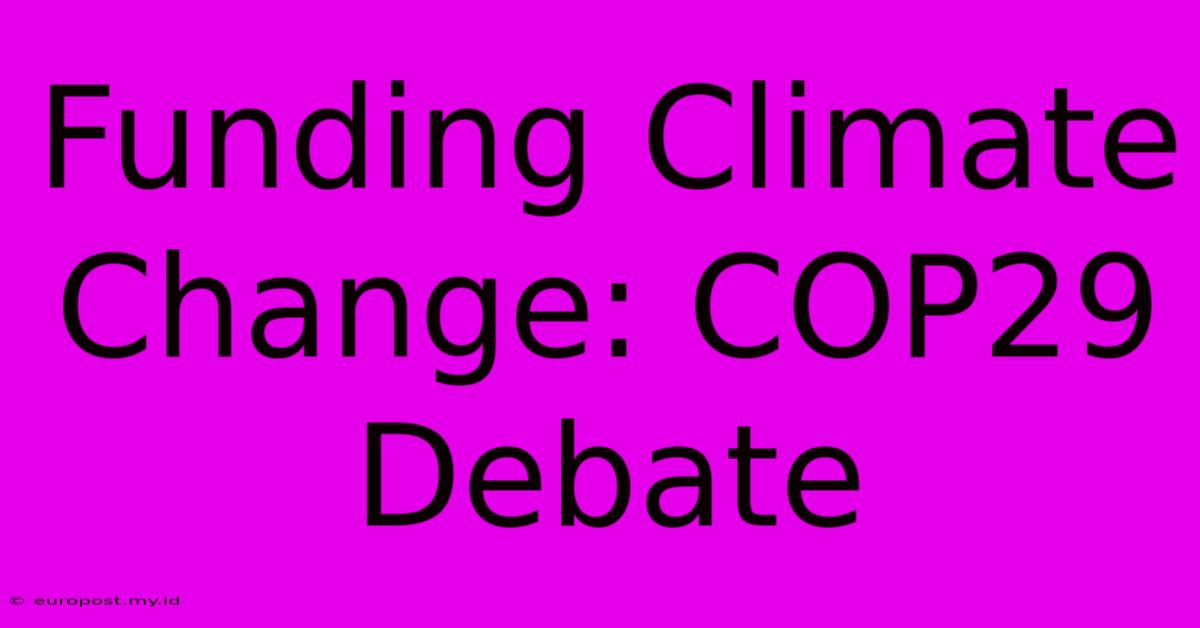Funding Climate Change: COP29 Debate

Discover more in-depth information on our site. Click the link below to dive deeper: Visit the Best Website meltwatermedia.ca. Make sure you don’t miss it!
Table of Contents
Funding Climate Change: A COP29 Showdown
The 2024 United Nations Climate Change Conference (COP29) looms large, and a central battleground will undoubtedly be the funding of climate change mitigation and adaptation. The commitments made in previous COPs remain largely unfulfilled, leaving developing nations particularly vulnerable and fueling growing tensions. This article delves into the key issues surrounding climate finance at COP29, exploring the challenges, the potential solutions, and the critical need for collaborative action.
The Unfulfilled Promises of Climate Finance
Developed nations pledged to mobilize $100 billion annually by 2020 to support climate action in developing countries. This target, however, has not been met, leaving a significant funding gap and eroding trust. This shortfall has far-reaching consequences, hindering efforts to:
- Reduce greenhouse gas emissions: Developing nations require financial assistance to transition to renewable energy sources, improve energy efficiency, and implement sustainable land-use practices. Without sufficient funding, these crucial transitions remain unattainable.
- Adapt to climate change impacts: Developing nations are disproportionately affected by the consequences of climate change, including sea-level rise, extreme weather events, and droughts. Adaptation measures, such as building resilient infrastructure and developing early warning systems, require substantial financial investment.
- Address loss and damage: Many developing countries are experiencing irreversible losses and damages due to climate change, such as displacement and destruction of infrastructure. Funding mechanisms to address these losses and damages remain underdeveloped and underfunded.
The Loss and Damage Fund: A Crucial Step Forward
While the establishment of the Loss and Damage Fund at COP27 was a significant breakthrough, its operationalization remains a major hurdle for COP29. Discussions will center on:
- Funding sources: Identifying reliable and sustainable sources of funding for the Loss and Damage Fund will be a key priority.
- Eligibility criteria: Clear and equitable criteria for accessing the fund need to be established to ensure that the most vulnerable nations receive support.
- Governance structure: An effective and transparent governance structure must be implemented to manage the fund and ensure accountability.
Beyond the $100 Billion Goal: Rethinking Climate Finance
The $100 billion target, while important, is merely a starting point. COP29 needs to address a broader range of issues related to climate finance, including:
- Scaling up finance: Substantially increasing the amount of climate finance available is crucial to meet the urgency of the climate crisis.
- Diversifying funding sources: Exploring alternative financing mechanisms, such as green bonds, carbon markets, and innovative financial instruments, can help diversify funding sources.
- Improving access to finance: Simplifying access to finance for developing countries, including reducing bureaucratic hurdles and providing technical assistance, is essential.
- Promoting private sector engagement: Mobilizing private sector investment in climate-friendly projects is crucial to scale up climate action. This requires creating an enabling environment through supportive policies and regulations.
- Focusing on Climate Justice: Ensuring that climate financing addresses the historical responsibility of developed nations for greenhouse gas emissions and prioritizes support for the most vulnerable populations is crucial for equitable outcomes.
COP29: A Turning Point for Climate Finance?
COP29 presents a critical opportunity to address the shortcomings of past climate finance commitments and pave the way for a more equitable and effective approach. The success of COP29 will depend on:
- Political will: Developed nations must demonstrate a strong political commitment to deliver on their climate finance pledges.
- Collaboration and trust: Building trust between developed and developing nations is essential for effective collaboration on climate action.
- Transparency and accountability: Ensuring transparency and accountability in the management of climate finance is crucial to build confidence.
The stakes are high. Failure to adequately address climate finance at COP29 could further exacerbate the climate crisis and undermine global efforts to achieve climate goals. The world needs strong leadership, commitment, and collaborative action to ensure that COP29 marks a decisive turning point in climate finance. The future of our planet depends on it.

Thank you for taking the time to explore our website Funding Climate Change: COP29 Debate. We hope you find the information useful. Feel free to contact us for any questions, and don’t forget to bookmark us for future visits!
We truly appreciate your visit to explore more about Funding Climate Change: COP29 Debate. Let us know if you need further assistance. Be sure to bookmark this site and visit us again soon!
Featured Posts
-
Old Ali Video On Tyson Resurfaces
Nov 16, 2024
-
Fernandes Captivated By Ronaldos Play
Nov 16, 2024
-
Denmark Vs Spain Official Team News
Nov 16, 2024
-
Chinas Fast Soft Power In Astronomy
Nov 16, 2024
-
Serrano Loses To Taylor Amidst Fan Outcry
Nov 16, 2024
